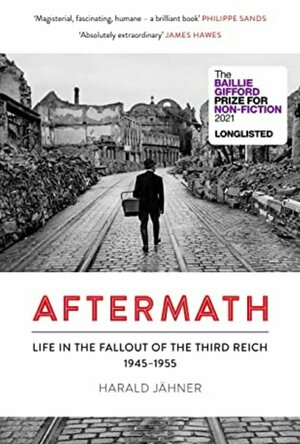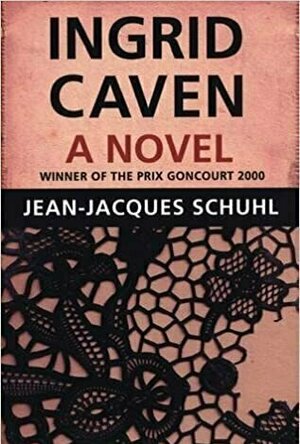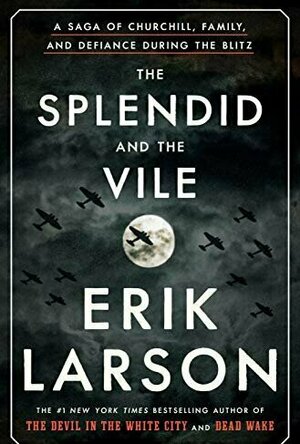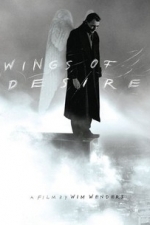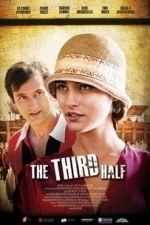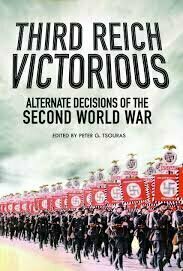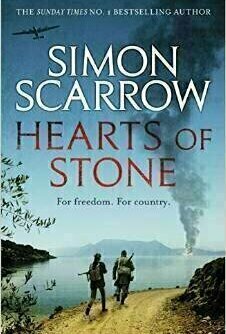Search
Search results
ClareR (6081 KP) rated Aftermath: Life in the Fallout of the Third Reich, 1945-1955 in Books
Feb 1, 2022
This is such an informative, interesting book about a period in German history that I know little about: 1945-1955. It shows that German cities were pretty much decimated by the end of the war, that ex-Nazi party members were forced to clean up the rubble and that most importantly, many Germans thought that they were hard done by, by the end of the war - their country in ruins, no industry and no food. But what’s most startling, is how quickly the German recovery was. Jähner states that this was in large part due to the return of the Germans who had been living in occupied countries.
The black market was also a huge earner for many German citizens: one teenager is described as having thousands of Marks worth of cigarettes in his house. Money was there to be made for the improvising, bold, German!
What probably resonated with me most, was the lot of the German woman. They had been expected to be the perfect German Female during National Socialism, then experienced a kind of social and sexual liberation after the end of the war. However, when their husbands and men returned from captivity (or just made their ways home), they found themselves being expected to revert to the stereotypical role of the housewife. But they wanted more. They wanted to continue in careers, they wanted equality, and they didn’t necessarily want to deal with broken, defeated husbands (as cruel as this may seem).
What really surprised me, was how was how former Nazi party members still worked in positions of influence, both politically and in industry - and this was the case in both East and West Germany. Even though the Allies made a point of ‘educating’ German citizens about the holocaust, National Socialists seemed to largely escape punishment and carried on with their lives. Their children may have had their doubts as to their parents innocence, and the real movement to ‘out’ the national guilt didn’t really get going until the 1960’s, but there was dissent in the 1950’s already.
I could go on. This is such an interesting book, and written so accessibly. It didn’t read at all like a dry history book, and the photos and posters from the time are well chosen and really add to the book as a whole. This isn’t just a history book for history buffs.
The black market was also a huge earner for many German citizens: one teenager is described as having thousands of Marks worth of cigarettes in his house. Money was there to be made for the improvising, bold, German!
What probably resonated with me most, was the lot of the German woman. They had been expected to be the perfect German Female during National Socialism, then experienced a kind of social and sexual liberation after the end of the war. However, when their husbands and men returned from captivity (or just made their ways home), they found themselves being expected to revert to the stereotypical role of the housewife. But they wanted more. They wanted to continue in careers, they wanted equality, and they didn’t necessarily want to deal with broken, defeated husbands (as cruel as this may seem).
What really surprised me, was how was how former Nazi party members still worked in positions of influence, both politically and in industry - and this was the case in both East and West Germany. Even though the Allies made a point of ‘educating’ German citizens about the holocaust, National Socialists seemed to largely escape punishment and carried on with their lives. Their children may have had their doubts as to their parents innocence, and the real movement to ‘out’ the national guilt didn’t really get going until the 1960’s, but there was dissent in the 1950’s already.
I could go on. This is such an interesting book, and written so accessibly. It didn’t read at all like a dry history book, and the photos and posters from the time are well chosen and really add to the book as a whole. This isn’t just a history book for history buffs.
Merissa (13782 KP) created a post
Jan 18, 2021
Rachel Kushner recommended Ingrid Caven in Books (curated)
Classic German Baking by Luisa Weiss is filled with 100 recipes of authentic German baking for breads and sweets! We learn what it means to bake like the Germans do and learn what techniques are different from us in America. With recipes like Apple Strudel to chocolate cakes that are to die for and even some healthy recipes as well. This book is the definition of German Baking that everyone will enjoy reading and making these recipes in their own homes!
This well-organized book is perfect of bakers from novices to pros. It the history of the each recipe before detailing in easy to follow step-by-step instructions how to bake. There's an extensive glossary of ingredients. My one recommendation is to have more pictures for a visual aspect.
I received this book from Ten Speed Press via NetGalley in exchange for an honest review.
This well-organized book is perfect of bakers from novices to pros. It the history of the each recipe before detailing in easy to follow step-by-step instructions how to bake. There's an extensive glossary of ingredients. My one recommendation is to have more pictures for a visual aspect.
I received this book from Ten Speed Press via NetGalley in exchange for an honest review.
Spectacular New Perspective
One of the greatest failures of our education system is its inability to make history interesting enough that people want to learn it so that we can stop repeating it. Then, we have Erik Larson. His brilliant writing technique turns dull historical facts into a story that forces you to continue turning the pages. Truly spectacular perspective of Churchill and those closest to him during a truly dark time in history. Also, a great glimpse of the German leaders as well. I'm truly looking forward to the next book of his I've ordered... and others after that. I think this should be a guide on how to bring history to a level that people can connect with.
John Taylor recommended Wings of Desire (1987) in Movies (curated)
This outstanding novel covers Adolf HitlerÕs meeting with Neville Chamberlain in 1938. The grave shadow of Chamberlain, deeply opposed to another conflict only twenty years after the Great War that had killed a generation of men. Against Hitler, 'the madman' ready to 'smash the Czechs' and blaze through new territories. This meeting in Munich is the focal point of the novel and Harris rewrites real events using two bystanders, one German, one English. Based on fact, Harris skilfully interweaves the lives of Hugh Legat and his English wife, rich, beautiful and unfaithful. Paul Von Hartmann and his lover, a secretary in the German foreign ministry, someone he may not entirely trust. It's Harris' attention to detail that makes this version of history so credible, right down to the description of the swastikas on the taps. A tightly woven thriller mixed with historical fact that will appeal to a lot of readers.
Ivana A. | Diary of Difference (1171 KP) rated The Third Half (Treto Poluvreme) (2012) in Movies
Aug 5, 2019
Powerful and emotional!
Determined to build the best football club in the country, Dimitry hires the German coach, Rudolph Spitz, to galvanize his rag tag team but - when the first Nazi tanks roll through the city and Rebecca, the beautiful daughter of a local banker, elopes with his star player, all Dimitry's plans must change.
A fight for freedom and keeping the nationality, a fight for love, a fight for survival - this is a must watch to everyone that has interest in history, or loves romance or football.
Emotional until the very end, powerful in every scene, and surrounded by funny moments throughout.
A fight for freedom and keeping the nationality, a fight for love, a fight for survival - this is a must watch to everyone that has interest in history, or loves romance or football.
Emotional until the very end, powerful in every scene, and surrounded by funny moments throughout.
Awix (3310 KP) rated Third Reich Victorious: Alternate Decisions of World War II in Books
Feb 24, 2020
There's been a certain tension when it comes to military history, pretty much since not long after the Second World War ended: pretty much everyone agrees that the Nazi Party was as close to evil incarnate as we will hopefully ever see, but many academics (amongst others) still harbour a sneaking admiration for the quality of the German war machine and its leadership. That tension is basically at the heart of this book; it's telling that several of the German victory scenarios outlines here are predicated on Hitler either being replaced or being markedly less of a genocidal bigot.
The what-ifs vary: what if Hitler served in the navy in the First World war, what if the Russians pre-empted Barbarossa and attacked Germany first, what if Turkey joined the Axis, what if the Germans got the atom bomb in 1944, what if Rommel defeated the D-day landings, deposed Hitler, and the war devolved into a one-front struggle with the Soviets? Most of these are interesting and seem to have been written with the general reader in mind; a few do suffer from getting bogged down with detail. On the whole it is engaging stuff, if recent military history is your thing, and you do come away with an improved awareness that the Second World War was a closer-run thing than most people realise nowadays.
The what-ifs vary: what if Hitler served in the navy in the First World war, what if the Russians pre-empted Barbarossa and attacked Germany first, what if Turkey joined the Axis, what if the Germans got the atom bomb in 1944, what if Rommel defeated the D-day landings, deposed Hitler, and the war devolved into a one-front struggle with the Soviets? Most of these are interesting and seem to have been written with the general reader in mind; a few do suffer from getting bogged down with detail. On the whole it is engaging stuff, if recent military history is your thing, and you do come away with an improved awareness that the Second World War was a closer-run thing than most people realise nowadays.
David McK (3721 KP) rated Hearts of Stone in Books
Feb 9, 2022
Not quite what the blurb makes out
Whilst I do associate Simon Scarrow with the genre of historical fiction, these tend to be set further back in history: mainly around the time of the Roman Empire; there or thereabouts.
Until recently, I've tended to avoid his few works that are more contemporary in nature, only recently (towards the end of last year) reading Blackout as I felt they were 'too close' (if that makes sense) for comfort for me in that there are still people alive who lived through the setting.
I must admit, I did quite enjoy Blackout so thought I would also give this a go, due to the roughly the same (WW2) setting.
This novel flits back and forth between then and 'now' (of 2013), as the descendants of the main 1940s settings character start to discover more about their ancestors - in particular, as history teacher Anna uncovers the story of her maternal grandmother Eleni, who participated in the Greek resistance on the island of Lefkas during 1943.
The whole had-a-German-friend in 1939 thing almost seems incidental to the story (he's not), until roughly about the final third.
And yes, I did pick up on the arguments in favour of teaching history (a subject I did, mostly, enjoy in school) passages.
Until recently, I've tended to avoid his few works that are more contemporary in nature, only recently (towards the end of last year) reading Blackout as I felt they were 'too close' (if that makes sense) for comfort for me in that there are still people alive who lived through the setting.
I must admit, I did quite enjoy Blackout so thought I would also give this a go, due to the roughly the same (WW2) setting.
This novel flits back and forth between then and 'now' (of 2013), as the descendants of the main 1940s settings character start to discover more about their ancestors - in particular, as history teacher Anna uncovers the story of her maternal grandmother Eleni, who participated in the Greek resistance on the island of Lefkas during 1943.
The whole had-a-German-friend in 1939 thing almost seems incidental to the story (he's not), until roughly about the final third.
And yes, I did pick up on the arguments in favour of teaching history (a subject I did, mostly, enjoy in school) passages.
